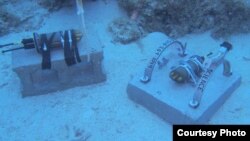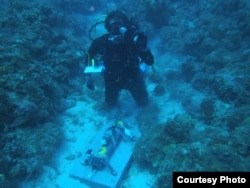Coral reefs are noisy places, especially the healthy ones. Two new studies assess that health by the sounds the reef dwellers produce.
Max Kaplan, a joint PhD candidate with Massachusetts Institute of Technology and Woods Hole Oceanographic Institution, is lead author on both papers. He and colleagues placed acoustic recorders on three reefs in the U.S. Virgin Islands National Park with varying degrees of coral cover and fish density. The autonomous devices recorded short bursts of sounds on a regular schedule over four months.
“These sounds are associated with a range of different behaviors from tracking mates, spawning, and finding prey to avoiding predators,” Kaplan said, reached at an international acoustics conference in Denmark.
Rich soundscape
Coral reefs are hotspots for biodiversity, harboring 25 percent of all marine species worldwide. But warmer ocean temperatures and acidification linked to global carbon emissions threaten this valuable resource and the economies they support.
Kaplan says keeping an ear on the reef can identify changes in animal abundance and distribution to designate areas for protection.
“The idea of the study and of the overall research is just to sort of look at the variation, in terms of the variable frequencies that are represented, and the different times of day that sounds are produced, to link the complexity and variability in sound production to the variability and diversity of the animals living on the reef," he said.
Kaplan says that link was most apparent at certain times of day – early morning and early evening - when light is changing. Snapping shrimp, which sound like frying bacon, were particularly vocal.
“When we looked at dusk and dawn we found that the strength of this daily trend of increasing sound production, at these two times of day, that trend was correlated with coral cover with fish density at the reefs,” he said.
At noon and at other times of day these louder sounds were muted. At those times, the three reefs sounded very much alike.
“It was really only the times of day where the soniferous animals, the animals producing sound, that were particularly active that we saw these differences,” Kaplan said.
The sound dying and rebirth
The findings are published in Marine Ecology Progress. Kaplan's second study, in Marine Pollution Bulletin, used the same raw data to analyze the effect of noise pollution from small craft on reef habitat. He notes that boat frequencies are low and frequently overlap the communication ranges of fish, drowning out vital sounds that organisms need to reproduce, feed and find new homes.
“So, there’s a potential masking effect going on there with vessel activity, especially if there is a lot of vessel activity, and it occurs around times when fish particularly use hearing or communication abilities,” Kaplan said.
The researchers are taking this work to the next step in a larger study in Hawaii, where they have already begun to monitor sound for 15 months at eight sites with coral cover ranging from 85 percent to almost none. Kaplan says he anticipates getting the signal of a bleaching event, when warming temperatures cause the coral to die.
“We can potentially hear that as the fish won’t appear on the sound records,” he said.
Kaplan says the low cost recorders can revolutionize how and how often we monitor reefs, and how we determine their health. He says this tool can help gather critical information, regulate boat traffic and even aid in rebuilding the reef ecosystem, by broadcasting sounds that will attract new denizens.












